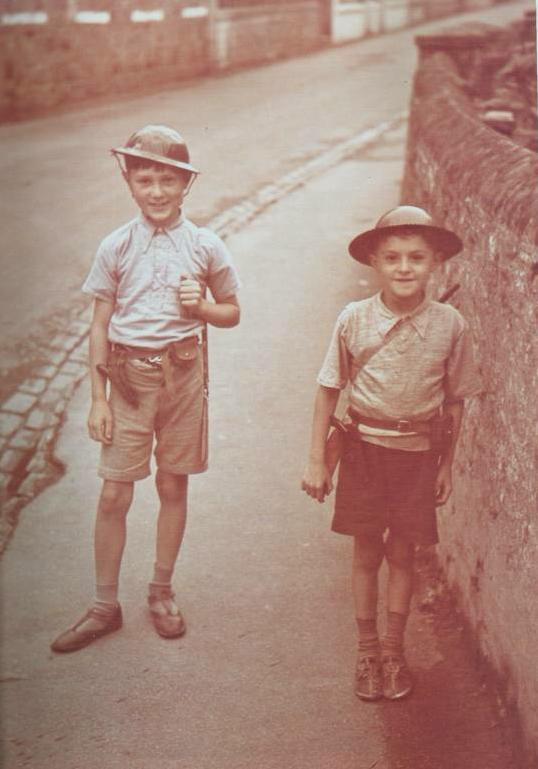
World War II: British Channel Islands--German Occupation (July 1940-May 1945)

Figure 1.--: Two boys in German occupied Guernsey, grinning at the German photographer who took the picture. Of course; Nazi propaganda at the time was trying to demonstrate to the rest of the British Isles that surrender would not be too bad an option and that life under the Germans could be tolerable. I am not sure when this photograph was taken, but suspect it was early in the occupation. And we do not know if the Germans continued to allow the boys to wear Tommy helmets.
|
|
The Islands thus became the only British territory to be occupied by the Germans during the War. There was no way Britain in 1940 could defend them. The Germans occupied the Islands without resistance (July 1940). On Jersey there were three rapes of Island girls in the first couple of weeks of German occupation. After a joint investigastion by the Jersey Police and the German Military Police three German soldiers were tried and publicly shot. Every able bodied adult on the Island was summoned to watch the executions. Afterwards the German Comnmandant announced in English and German that there was one law on the Island for English and Germans alike and anyone who broke it would be shot. German soldiers could also be shot for looting or stealing from the population. Wehrmacht pollicies varied greatly depending on where they were stationed. Commanders in the West enforced a degree of disipline. Commanders in the East (Poland and Soviet Union) rarely punished men for abuses of the civilian population. The Germans stationed a very substantial garrison on the Island. The Jersey garison alone exceeded 11,500 men. The substantial German garrison and small size of the islands meant that any significant resistance was impossible. The Germans issued a range of strict regulations. Identity papers were issued and had to be carried. Strict curfews were enforced. The Germans confiscated all vehicles and even bicycles. The islanders had to walk or use horses. All radios had to be turned in to the Germans. The German occupation authorities took over the island newspaper. Many civilians that were not native to the islands were deported to internment camps in the Reich. Their homes and possesssions were often looted or otherwise damaged. There were six movie theaters which operated on the islands during the occupation. We are not entirely sure what was shown. There vprobably were a few British films at the theater When the Occupation started. But they ciuld have been only shown a few times, if the Germans allosed them at all. German movies were shown. Both islanders and the German troops frequented the theaters. We suspect that French films were shown. The French film industry continued to operate during the occupation.
German Seizure
The Islands thus became the only British territory to be occupied by the Germans during the War. There was no way Britain in 1940 could defend them. The Germans occupied the Islands without resistance (July 1940).
German Administration
The first German commander was Oberst Graf von Schmettow. He was replaced with Vice-Admiral Huffmeier (June 1944). Soon after the Allies cut off the Islands. Admiral Huffmeier formerly captained the battle crussier Sharnhost. He had a much more aggressive outlook.
German Garrison
The Germans stationed a very substantial garrison on the Island. The Jersey garison alone exceeded 11,500 men. This was to create a huge problem after D-Day when the Islsnds were cut off. There was no way to feed such a large added population.
Military Justice
On Jersey there were three rapes of Island girls in the first couple of weeks of German occupation. After a joint investigastion by the Jersey Police and the German Military Police three German soldiers were tried and publicly shot. Every able bodied adult on the Island was summoned to watch the executions. Afterwards the German Comnmandant announced in English and German that there was one law on the Island for English and Germans alike and anyone who broke it would be shot. German soldiers could also be shot for looting or stealing from the population. Wehrmacht pollicies varied greatly depending on where they were stationed. Commanders in the West enforced a degree of disipline. Commanders in the East (Poland and Soviet Union) rarely punished men for abuses of the civilian population.
German Restrictions
The substantial German garrison and small size of the islands meant that any significant resistance was impossible. The Germans issued a range of strict regulations. Identity papers were issued and had to be carried. Strict curfews were enforced. The Germans confiscated all vehicles and even bicycles. The islanders had to walk or use horses. All radios had to be turned in to the Germans. The German occupation authorities took over the island newspaper.
Deportations
Many civilians that were not native to the islands were deported to internment camps in the Reich. Their homes and possesssions were often looted or otherwise damaged.
Movies
There were six movie theaters which operated on the islands during the occupation. We are not entirely sure what was shown. There probably were a few British films at the theater When the Occupation started. But they could have been only shown a few times, if the Germans allosed them at all. German movies were shown. Both islanders and the German troops frequented the theaters. We suspect that French films were shown. The French film industry continued to operate during the occupation.
Children
HBC

Navigate the Boys' Historical Clothing Web Site:
[Return to Main British Channrl Islands World War II page]
[Return to Main United Kingdom World War II page]
[Introduction]
[Activities]
[Biographies]
[Chronology]
[Clothing styles]
[Countries]
[Bibliographies]
[Contributions]
[FAQs]
[Glossaries]
[Images]
[Links]
[Registration]
[Tools]
[Boys' Clothing Home]
Created: 8:45 AM 9/22/2009
Last updated: 8:45 AM 9/22/2009



